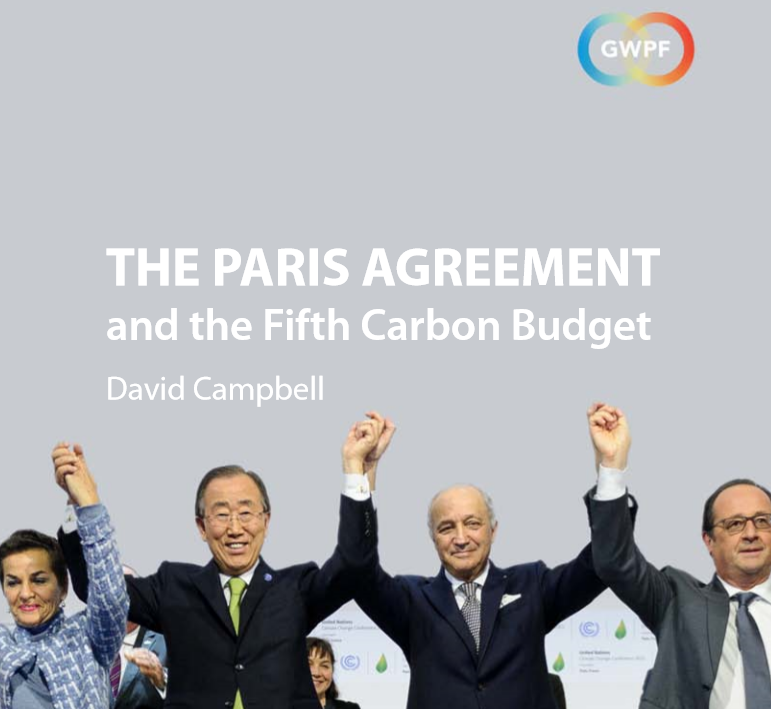HUGE!
Geologists Discover The US’s Largest Natural Gas Deposit
Brougth to you by Benny Peiser's Global Warming Policy Forum
Geologists Discover The US’s Largest Natural Gas Deposit
Brougth to you by Benny Peiser's Global Warming Policy Forum
President Trump’s top environment official called for an “exit” from the historic Paris agreement Thursday, the first time such a high-ranking administration official has so explicitly disavowed the agreement endorsed by nearly 200 countries to fight climate change. Speaking with “Fox & Friends,” Pruitt commented, “Paris is something that we need to really look at closely. It’s something we need to exit in my opinion.” “It’s a bad deal for America,” Pruitt continued. “It was an America second, third, or fourth kind of approach. China and India had no obligations under the agreement until 2030. We front-loaded all of our costs.” --The Washington Post, 14 April 2017
The Paris Climate Agreement, far from securing a reduction in global CO2 emissions, is fundamentally a blank cheque that allows China and India to increase their emissions as they see fit in pursuit of economic growth. This is the conclusion of a paper by Law Professor David Campbell (Lancaster University Law School) and published by the Global Warming Policy Foundation. Indeed, the Paris Agreement contains a categorical statement that countries such as China and India will not be obliged to undertake any reductions. --Global Warming Policy Foundation, May 2016
The U.S. Geological Survey (USGS) discovered the largest continuous natural gas deposit in the country, stretching across the Gulf Coast states of Texas and Louisiana. USGS estimates between 4 billion barrels of oil and 304.4 trillion cubic feet of natural gas sit untapped in the Haynesville and Bossier shale formations. More natural gas was found in these two formations than any other continuous assessment the USGS has ever conducted. Secretary of the Interior Ryan Zinke tweeted “HUGE!” on news of the find Thursday. The Trump administration has promised to roll back regulations on oil and gas drilling. --Andrew Follett, Daily Caller, 14 April 2017
The number of solar panels being installed in the UK has fallen by more than 80 per cent, according to an analysis of new figures in the latest sign that the industry is being strangled by government policies despite being one of the cheapest (sic) sources of electricity. The Solar Trade Association (STA), which produced the figures based on recently released government statistics, found the first three months of this year had seen a catastrophic collapse in the number of solar panels being put up following the withdrawal of virtually all subsidies, a stunning business rate hike of up to 800 per cent and the imposition of “red tape”. --Ian Johnston, The Independent, 14 April 2017
Ireland is unlikely to avoid having to pay multimillion-euro fines for missing emissions targets, the Environmental Protection Agency has warned. The country is “doomed” to face hundreds of millions of euros in sanctions. Emissions from the agriculture and transport sectors are increasing at a rapid pace, the watchdog said yesterday. It forecasted that by 2020 the country would reduce greenhouse gas emissions by only 4 to 6 per cent from 2005 levels, despite a 20 per cent target it is legally bound to achieve. Environmentalists and opposition parties condemned the government yesterday for failing to act and said that the country was “doomed” to face hundreds of millions of euros in sanctions. --Catherine Sanz, The Times, 14 April 2017
The number of solar panels being installed in the UK has fallen by more than 80 per cent, according to an analysis of new figures in the latest sign that the industry is being strangled by government policies despite being one of the cheapest (sic) sources of electricity. The Solar Trade Association (STA), which produced the figures based on recently released government statistics, found the first three months of this year had seen a catastrophic collapse in the number of solar panels being put up following the withdrawal of virtually all subsidies, a stunning business rate hike of up to 800 per cent and the imposition of “red tape”. --Ian Johnston, The Independent, 14 April 2017
Ireland is unlikely to avoid having to pay multimillion-euro fines for missing emissions targets, the Environmental Protection Agency has warned. The country is “doomed” to face hundreds of millions of euros in sanctions. Emissions from the agriculture and transport sectors are increasing at a rapid pace, the watchdog said yesterday. It forecasted that by 2020 the country would reduce greenhouse gas emissions by only 4 to 6 per cent from 2005 levels, despite a 20 per cent target it is legally bound to achieve. Environmentalists and opposition parties condemned the government yesterday for failing to act and said that the country was “doomed” to face hundreds of millions of euros in sanctions. --Catherine Sanz, The Times, 14 April 2017
In a statement announcing the latest round of auctions for Contracts for Difference the UK government has reported capital investment of £52 billion in renewable electricity generation over the period from 2010 to the present day, which implies an average capital cost of about £2.5m/MW, five times the cost of Combined Cycle Gas Turbines. This represents a convenient measure of both the opportunity cost and the scale of the potential malinvestment. --John Constable, GWPF Energy, 12 April 2017



No comments:
Post a Comment